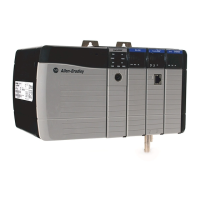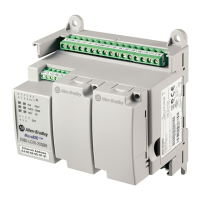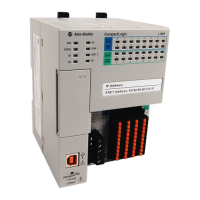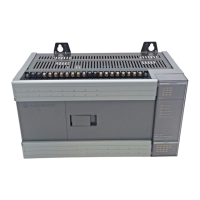Rockwell Automation Publication 1756-RM003N-EN-P - October 2011 207
Input/Output Instructions (MSG, GSV, SSV, IOT) Chapter 4
Program Attributes
The Program object provides status information about a program. Specify the
program name to determine the Program object you want.
Instance DINT GSV Provides the instance number of this module object.
LEDStatus INT GSV Specifies the current state of the I/O status indicator on the front of the controller.
(1)
Value Meaning
0 Status indicator off: No Module objects are configured for the controller.
(There are no modules in the I/O Configuration section of the controller organizer.)
1 Flashing red: None of the Module objects are Running.
2 Flashing green: At least one Module object is not Running.
3 Solid green: All the Module objects are Running.
You do not enter an object name with this attribute because this attribute applies to the entire
collection of modules.
Mode INT GSV
SSV
Specifies the current mode of the Module object.
Bit Meaning
0 If set, causes a major fault to be generated if any of the Module object
connections fault while the controller is in Run mode.
2 If set, causes the Module object to enter Inhibited state after shutting
down all the connections to the module.
(1) The 1756-L7x controllers do not have a status indicator display on the front of the controller, but do use this functionality.
Attribute Data Type Instruction Description
Attribute Data Type Instruction
within
Standard
Task
Instruction
within
Safety Task
Description
DisableFlag SINT GSV
SSV
None Controls this program’s execution.
Value Meaning
0 Execution enabled
non-zero) Execution disabled
DINT GSV GSV A non-zero value will disable.
LastScanTime DINT GSV
SSV
None Time it took to execute this program the last time it was executed. Time is in
microseconds.
MajorFault
Record
DINT[11] GSV
SSV
GSV
SSV
Records major faults for this program
We recommend that you create a user-defined structure to simplify access to the
MajorFaultRecord attribute:
Name Data TypeStyleDescription
TimeLow DINTDecimalLower 32 bits of fault timestamp value
TimeHigh DINTDecimalUpper 32 bits of fault timestamp value
Type INTDecimalFault type (program, I/O, and so forth)
Code INTDecimalUnique code for the fault (depends on fault type)
Info DINT[8]HexadecimalFault specific information (depends on fault type and code)

